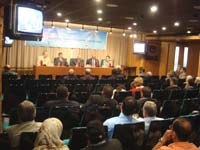Introductory Training Course on Ballast Water Management Issues kicks off GEF/UNDP/IMO GloBallast Partnerships Project activities starts in the Mediterranean region – Apr 14, 2008
An Introductory Training Course on Ballast Water Management organised by REMPEC in Alexandria, Egypt, between 14 April and 17 April 2008, with the support of the Arab Academy for Science, Technology and Maritime Transport (AASTMT) of Alexandria, Egypt, kicked off the GEF/UNDP/IMO GloBallast Partnerships Project activities starts in the Mediterranean region.
The training course was organised within the framework of the GloBallast Partnerships Project a global joint initiative of the Global Environment Facility (GEF), the United National Development Programme (UNDP) and the International Maritime Organization (IMO). The Project aims at assisting developing countries to reduce the transfer of harmful aquatic organisms and pathogens in ships’ ballast water, build capacity to address the ballast water issues, undertake legal, policy and institutional reform and implement the International Convention for the Control and Management of Ships’ Ballast Water and Sediments (BWM Convention) adopted under the aegis of IMO.
Over the past two decades, ships’ ballast water has been recognized as one of the major vectors for the introduction of harmful aquatic organisms and pathogens into aquatic environment and the introduction of invasive species was recognised as one of the four biggest threats to the marine environment.
IMO’s activities to address this issue have included the development of a regulatory regime – culminating in the adoption of the International Convention for the Control and Management of Ships’ Ballast Water and Sediments in February 2004, as well as the GloBallast Programme, which included a pilot phase addressing the issue in six Pilot Countries (2000-2004) and a follow-up phase (2008-2012) to be implemented in six priority regions, including the Mediterranean. REMPEC was identified as the Regional Coordination Organisation (RCO) to facilitate the implementation of the Project in the region, in consideration of the relevance of the Partnership’s objectives to the mandate of the Centre.
The Training Course, which was financed by the IMO’s Integrated Technical Co-operation Programme, targeted personnel having different skills, knowledge and experience in ballast water management related issues. The objective of the Training Course was to provide a common set of knowledge and skills to all participants to enable them to take appropriate action in their various capacities with a view to promoting uniform implementation of the BWM Convention.
An additional objective of the training course was to build the necessary capacity in the participating Mediterranean coastal States by providing a “train-the-trainer” opportunity, leading to the organisation and delivery of national level introductory trainings on ballast water management, thus resulting in a multiplier/cascading effect. The training was attended by representatives from Albania, Algeria, Croatia, Egypt, Libya, Montenegro, Morocco, Syria, Tunisia and Turkey.
During the Training Course, which also included multimedia presentations including a TV documentary, tests, practical exercises and a role play, the following topics were addressed:
- Background to Ballast Water Management;
- Ballast Water Management Onboard Ships;
- Standards for Ballast Water Management;
- Operational Aspects on Ship-board Ballast Water Management;
- Ballast Water Management by Port/Coastal State;
- Compliance Monitoring and Enforcement;
- Incursion Management;
- Development of a National Strategic Framework to Ballast Water Management; and
- Technical Assistance and Regional Co-operation.
The discussions resulted in a set of recommendations by the group of participants, to be put forth to the forthcoming Mediterranean Region Task Force Meeting, which is expected to discuss and develop a regional strategy for ballast water management.
Commenting on the Training Course, Mr. Murat Korçak from Turkey, one of the two Lead Partnering Countries within the GloBallast Partnerships, said: “Ballast water management is one of the most difficult systems to put in place for the maritime industry. Because all the stakeholders, like ports, ships, scientific institutes, governmental bodies and NGO’s have to be work collectively and accurately together. This training activity was a great instrument to raise the awareness of Mediterranean Countries, in order to build their capacity in consistency with the Ballast Water Convention. Consequently, this was a first important step, but we know that we have a long way to walk”.
Ms. Ivana Marovic, from Croatia, stated : « the issue of ballast water management is of high concern for the Government of Croatia, and several activities were carried out in this field. The Training Course was a great opportunity to update myself on initiatives being undertaken at global, regional and national level, as a part of the GloBallast initiative. Moreover, the content of the lectures and exercises provided me with a comprehensive and useful background for conducting similar trainings at national level. One important aspect of the Training Course was the interaction and exchange of experiences among the participants, which gave me an insight on how seriously other countries in the region have recognized the problem of introduction of harmful aquatic organisms and pathogens into new marine ecosystems and what actions they have taken so far. The Government of Croatia is a Lead Partnering Country within the GloBallast Partnerships, and will continue to use all the necessary resources to develop a mechanism for preventing and controlling the introduction of invasive harmful species by ship’s ballast water as well as raising the awareness on ballast water issues among its citizens ».


